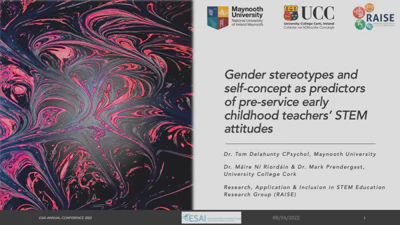RAISE at the Educational Studies Association of Ireland (ESAI) 2022 Annual Conference

RAISE was represented at the recent Educational Studies Association of Ireland (ESAI) 2022 Annual Conference. The conference was held online and was virtually hosted Merino Institute of Education. The group presented two papers covering current projects underway in RAISE.
Lesson study motivation
Tom Delahunty and Aoibhinn Ní Shúilleabháin presented on their recent work examining the motivational and attitudinal factors underpinning practicing mathematics teachers’ engagement rates in Lesson Study. The work has implications for the implementation of this model of CPD in Irish second level schools. Some of the main findings from the quantitative study include:
- Attitudes to self-development in Lesson Study are significant predictors of the likelihood of someone opting to engage in this mode of teacher education
- This prediction is stronger for those who are likely to do more than one cycle
- Teachers’ attitudes to Lesson Study are related to their mathematics teaching self-efficacy Self-efficacy completely mediates the direct effect of attitudes on the odds of participating in Lesson Study
You can access the full PowerPoint deck here
Gender stereotypes in early childhood STEM education
Tom Delahunty, Máire Ní Ríordáin & Mark Prendergast presented their recent work on the role that gender stereotype beliefs might play in early childhood student teachers’ attitudes towards STEM. This research had a number of core findings such as:
Student teachers demonstrated significant gender stereotype spanning ability and sociocultural beliefs favouring STEM as a more masculine area There was also a significant relationshipo between participants’ endorsement of stereotypic gender roles in STEM and their overall attitudes to STEM Participants’ math self-concept also significantly related to both stereotyped view of the Humanities (& STEM), and overall attitudes to STEM
While there is further analysis to be conducted on the data, these initial findings have significant implications for recent policy advocating for inclusion of STEM education in the early childhood curriculum in Ireland.

You can access the full slide deck here